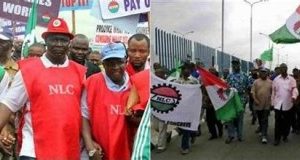
The meeting took place after the Department of State Security (DSS) released a security assessment that revealed a scheme by some elements to organize violent protests in an effort to cast doubt on the Federal Government and security agencies over various socio-economic issues.
Mohammed Badaru, the minister of defense, and Bello Mattawale, the minister of state for defense, had just been sworn in as members of the Federal Executive Council (FEC), and this was their first security meeting since then.
Prior to the President’s journey to India to attend the G-20 leaders conference, the security chiefs kept quiet about what was discussed during the meeting and the new instructions they received from him.
General Christopher Musa, Chief of Defence Staff, Lieutenant-General Taoreed Lagbaja, Admiral Emmanuel Ogalla, Chief of the Navy, and Air Marshal Hassan Abubakar, Chief of the Air Staff, were also present at the meeting.
While the Trade Union Congress of Nigeria (TUC) has given President Tinubu one week to make a categorical statement on wage awards, tax exemptions and allowances to public sector workers, to cushion the blow, the Nigeria Labour Congress (NLC) yesterday avoided the meeting with the Minister of Labour and Employment, Simon Lalong, stating that the government’s move was to frustrate its effort to embark on the two-day nationwide warning strike today.
At a press conference yesterday in Abuja, the labor minister pleaded with the NLC to call off its warning strike. Lalong claimed that the three levels of government are putting measures in place to lessen the effects of the elimination of fuel subsidies.
He claimed that the request for the strike’s suspension was made necessary to prevent the breakdown of industrial peace, which would undoubtedly undo some of the progress the government had already made.
He stated that although certain policies are being prepared and fine-tuned, others are being implemented as measures to temporarily relieve Nigerians’ plight. He further stated that other steps would be announced in the upcoming weeks after consulting with the labor leadership and other important stakeholders.
Therefore, it urged the Minister to remedy the “anomaly,” which it claimed could damage the country’s reputation on the international stage and interfere with its industrial relations procedures.


Share your thoughts